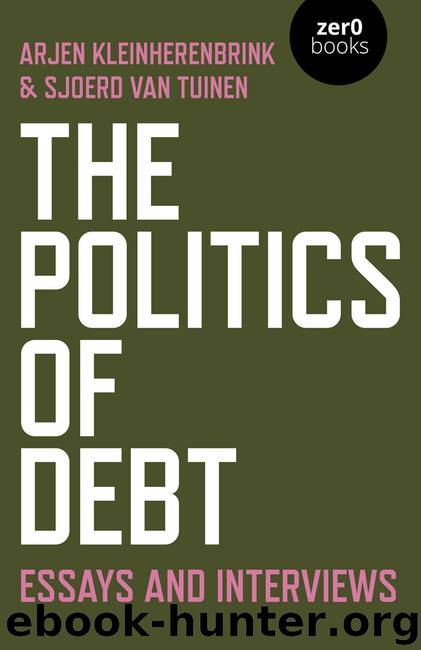The Politics of Debt by Sjoerd van Tuinen;Arjen Kleinherenbrink; & Arjen Kleinherenbrink

Author:Sjoerd van Tuinen;Arjen Kleinherenbrink; & Arjen Kleinherenbrink
Language: eng
Format: epub
Publisher: John Hunt (NBN)
Published: 2019-11-18T16:00:00+00:00
Genealogy of debt
In an early fragment entitled “Capitalism as Religion,” Walter Benjamin – following up on the analysis presented by Friedrich Nietzsche in On the Genealogy of Morality – highlights, with great prophetic ability, the mechanism of infinite indebtedness at the core of the capitalist economy.10 The connection between “debt” and “guilt” – implicit in the German word Schuld/Schulden, which covers both meanings – is central to this discussion.
In defining capitalism as an essentially religious phenomenon, Benjamin refers to the opening lines of Max Weber’s well-known work on the capitalist economy’s origin in Protestant asceticism.11 According to Weber, the dominion of the capitalist economy is based on the intimate link that economic power establishes with individual forms of life. The “accounting” of existence implicit in the methodical control of ascetic practice means that “the sanctification of life” could “almost assume the character of a business,” whose success is in itself a sign of approval.12 The same mechanism, Weber argues, lies at the basis of the capitalist enterprise, which (significantly for our discussion) is the main subject of his analysis. Weber was, in fact, one of the first to emphasize the centrality of the enterprise and the figure of the entrepreneur in the dominance of the capitalist economy, in a sense predicting the developments we have seen in recent decades with the hegemony of the figure of the “entrepreneur of himself.”
However, in the excerpt mentioned above, Benjamin criticizes Weber. In fact, he claims that the relationship between capitalism and religion relates not only to the historic development of secularization which, according to him, would emerge from the Weberian approach – that is to say, from the progressive and general detachment of other spheres of life from the religious sphere. Instead, he argues that the relationship implies a deeper connection, whose origin should be studied in entirely different terms. According to Benjamin, it cannot be only “Calvinism” that is involved here, as Weber argued, but rather Christianity as a whole. This is because, as Benjamin argues in the excerpt, “capitalism has developed as a parasite of Christianity in the West [...], until it reached the point where Christianity’s history is essentially that of its parasite – that is to say, of capitalism.”13
Benjamin therefore identifies a direct “parasitic” derivation of capitalism from Christianity, which in a way expands the dimension outlined by Weber, while cleansing it, however, of its linear historical development. Instead, a shared genealogical origin emerges between the two phenomena, which in my view makes Benjamin’s approach extremely similar to the one proposed by Michel Foucault during the courses at the Collège de France in the late 1970s, which have become famous because it was there that neoliberalism was considered for the first time not only as an economic theory but as a new form of domination and political establishment.14
Consistently with the genealogical method used by Benjamin, Foucault also identifies a link between economic power (fundamentally intense as a form of government, as “governmental power”) and Christianity, but not as simply a historically preexisting, foundational fact.
Download
This site does not store any files on its server. We only index and link to content provided by other sites. Please contact the content providers to delete copyright contents if any and email us, we'll remove relevant links or contents immediately.
The Secret History by Donna Tartt(16606)
The Social Justice Warrior Handbook by Lisa De Pasquale(11485)
Thirteen Reasons Why by Jay Asher(7780)
This Is How You Lose Her by Junot Diaz(5753)
Weapons of Math Destruction by Cathy O'Neil(5029)
Zero to One by Peter Thiel(4816)
The Myth of the Strong Leader by Archie Brown(4785)
Promise Me, Dad by Joe Biden(4440)
Stone's Rules by Roger Stone(4412)
Beartown by Fredrik Backman(4403)
How Democracies Die by Steven Levitsky & Daniel Ziblatt(4392)
The Fire Next Time by James Baldwin(4336)
100 Deadly Skills by Clint Emerson(4070)
A Higher Loyalty: Truth, Lies, and Leadership by James Comey(4024)
Rise and Kill First by Ronen Bergman(4008)
The David Icke Guide to the Global Conspiracy (and how to end it) by David Icke(3875)
The Farm by Tom Rob Smith(3869)
Secrecy World by Jake Bernstein(3773)
The Doomsday Machine by Daniel Ellsberg(3725)
